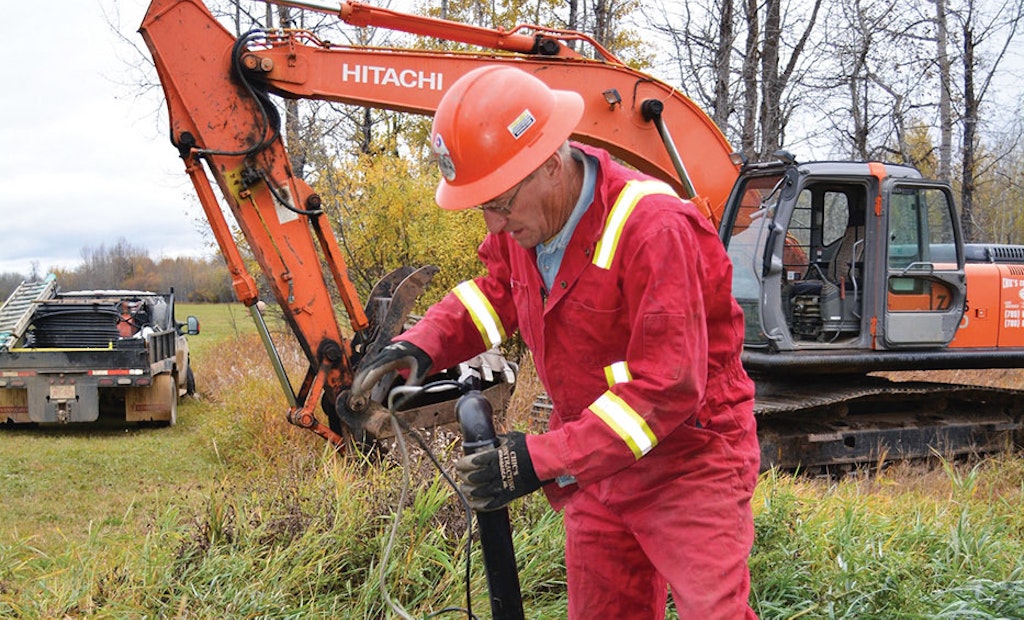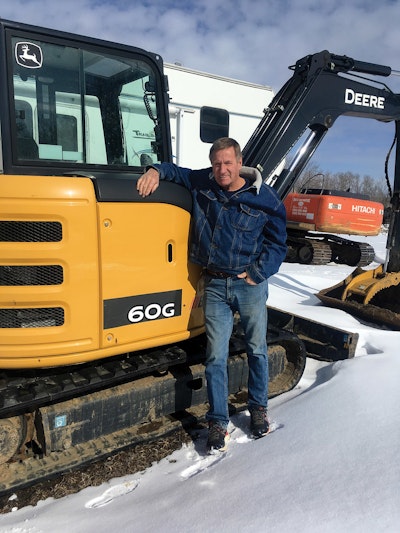
Shaw removes improperly installed electrical conduit in preparation for a tank replacement. His Hitachi Zaxis excavator is shown in the background.
In States Snapshot, we visit with a member of a state, provincial or national trade association in the decentralized wastewater industry. This time, we learn about a member of the Alberta Onsite Wastewater Management Association.
Chic Shaw: President
Business: Chic’s Contracting, Athabasca, Alberta
Age: 72
Years in the industry: 34
Association involvement:
I am the current president of the Alberta Onsite Wastewater Management Association and have been a member for 20 years.
Benefits of belonging to the association:
Keeping abreast of the changing times and changing our techniques accordingly is the big thing. We do a lot of education. And, of course, any time there’s a change, we’re right up to date on it. In fact, we usually take part in it. Nothing changes in the province without our input.
Biggest issue facing your association right now:
We need more enforcement of regulations to stop bad operators. It’s a big problem everywhere in North America, I think. The government is willing to make laws but not always willing to back them up. But we have made some big strides lately. Alberta Municipal Affairs has created a working group, which includes members of our industry, as well as the inspections people, so they’re making an effort. But it’s tough because enforcement is always a legal problem and it costs a lot of money to go to court. That’s another benefit of the association — we’ve pressed long enough that the government is starting to see the reason behind the need for enforcement.
Our crew includes:
Myself; Don Olsen, laborer/operator; and my wife, Diane, to run the office and do the paperwork.
Typical day on the job:
At one time we were a lot bigger and carried a big crew. We built subdivisions and did oil field work. I had both my kids working for me, but when they decided to leave the company and go their own way, we decided to downsize and just stick to private sewage. Plus, now that I’m 72, I don’t want to work that hard any more. So, a typical day these days is anything from meeting-and-greeting a customer, bidding on projects, moving equipment, and doing installs, which, even with my small crew, we put in over 50 installs last year. In the winter, I work in the shop and just try and keep busy so I don’t seize up!
The job I’ll never forget:
One summer the forecast was for a drought. They were even telling farmers not to plant anything. A small village had been wanting us to build a lagoon for them so I thought that would be a great year to do it. So we made these huge holes in the ground, which is like a big funnel, and then it started to rain, and it rained every day. We had the pumps going. We had to dry the soil to compact it. It was pretty expensive since we were living in hotels and eating in restaurants and it took us 2 1/2 months instead of the one month I had planned on.
My favorite piece of equipment:
I like the excavators. I can be digging the hole and see the whole job and what needs to be done because every time I turn, I’m looking the whole field over. We’ve got radio communication, so I can just pick that up and say to the guy in the dozer or loader, “Hey, I need you to do this.” Basically I can run the job from sitting in a seat. We’ve got a John Deere 200LC and a Hitachi Zaxis 200, which are basically the biggest you can carry on a truck without having to put extra wheels on. And then we have a smaller unit, a John Deere 60G.
Most challenging site I’ve worked on:
About four years ago, we worked on a subdivision in Athabasca, doing all the underground work for it — the big pipe. It had a high water table and slouching sides. Mostly it was around 20 feet and the water table was around 10 feet, so you know you’re going to get water in there. We were dewatering and had to keep moving. If we stopped for coffee, we had to dewater right away and use washed rock to stabilize it. We used a steel shoring box inside the ditch to keep the sides from caving in on the men working in the ditch. The shoring box was 35 feet long, so we could put the pipe right down inside of it. We had two guys who never got out of that box from morning until night except for coffee and lunch. We dug with the excavator in front of the box, and then grabbed a hold of it and just kept pulling it forward.
The craziest question I’ve been asked by a customer:
“What makes a better septic tank, a car or a pickup?”
If I could change one industry regulation, it would be:
That a sewage design would be approved before a building permit is issued. There are a few counties that do it, but not many. As an example, I went out to one site and discussed with the builder where he wanted the septic tank. Then I asked him where he was going to put the discharge, and he said, “Well, I’m just going to run it over to the fence.” He didn’t realize you can’t do that; you’re pumping into your neighbor’s yard. We had to put the septic system all the way around the other side of the house because the plumbing and concrete were already in and then had to ditch all the way around the house. If he had applied for a permit before they allowed him to build, that would have all been found out. Most of the time it ends up costing the customer a lot of money.
Best piece of small-business advice I’ve heard:
“Always look after your reputation,” and “Don’t try to borrow yourself out of debt.” I heard this from the manager of a car wash I worked at when I was 16 years old.
If I wasn’t working in the wastewater industry, I would:
Still be working in the oil industry. Before I got married and had kids, I worked in 34 countries all over the world in the oil business. I wanted to see the world on somebody else’s dollar.
Crystal ball time – This is my outlook for the wastewater industry:
Onsite sewage treatment systems will continue to become more popular. As big pipe becomes more expensive to build and maintain, on site is a perfect way to recycle wastewater and maintain our aquifers by returning water back to where it came from. We must continue to educate the industry if we wish to remain good stewards of the environment.






